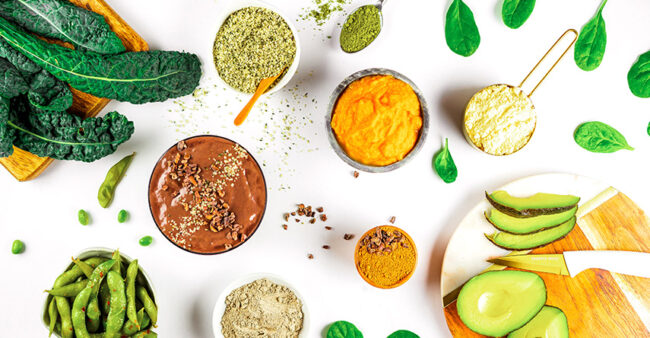Hiya Gorgeous,
Do you feel perkier just thinking about sipping a delicious cup of coffee? Let’s be honest, for many people (myself included) that morning cup of joe is a treasured ritual. But, when one cup becomes two and then three and then another after lunch and so on… it might start to feel more like an addiction than a treat.
Don’t get me wrong, I’m not here to demonize your java. I love mine and I drink one cup in the morning, a few times per week. And for all you data lovers like me, there’s even some research showing that the benefits of coffee outweigh the risks (study)!
But if coffee has a tight grip on you and you experience caffeine withdrawal symptoms when you don’t drink it, there may be more downsides than upsides to this beverage for you. So, let’s talk about some of the health benefits of coffee as well as potential risks, and what you can do to reduce your intake and/or enjoy it in moderation.
So, is coffee bad for you?
We’ll start by covering some of the main reasons coffee gets a bad rap, but before we do, I want to clarify one thing. Most coffee concerns crop up if you’re drinking more than two cups per day. I’m sharing info about the risks with you not to scare you away from coffee, but so you have the full picture. This way, you can make an informed decision about whether or not coffee is right for you. Plus, I know how you love taking charge of your health and learning about this stuff!
Coffee and Sleep Health
A good night of sleep, especially between 11 p.m. and 7 a.m. helps you heal, for real. Restful sleep activates your body’s own regenerative abilities—it’s the time when your body repairs and restores itself. But, coffee (because of its caffeine content) can be the enemy of restful sleep.
How long does caffeine stay in your system?
Caffeine has a half-life of about 5 hours. So if you consume 40 mg of caffeine at 3 p.m., you’ll still have 20 mg in your system when 8 p.m. rolls around. To give that some context, one 8-oz cup of coffee contains about 163 mg of caffeine (source), though levels can vary based on the brewing method.
One study measured sleep quality when people consumed 400 mg of caffeine (about the amount in a Venti Starbucks) at bedtime, 3 hours before bedtime and 6 hours before bedtime. All groups experienced a statistically significant reduction in sleep. So, even that mid-afternoon java break may be disrupting the restfulness and quality of your Zzzs.
Coffee and Adrenal Health
Caffeine triggers neurons in your brain that tell your adrenal glands to start producing adrenaline. This “fight or flight” response is perfect when you need to lift a car off of an injured person, but not if you’re sitting at your desk sorting through emails. When the adrenaline wears off, you’re left feeling wiped out, anxious and moody. Next stop? You guessed it! Off to dose up on more caffeine, sugar or other stimulants. It’s a vicious daily cycle.
This continuous roller coaster results in adrenal exhaustion. And when your adrenal glands are tired out, they can’t be as effective at their many jobs, which include:
- Producing other essential hormones
- Boosting your immune system
- Regulating the health of your body tissues
- Balancing blood sugars
Plus, regular coffee drinkers tend to need more and more caffeine over time to get the same adrenaline boost, which can lead to adrenal burnout.
Signs of adrenal burnout include:
- Relentless fatigue
- Constant low blood sugars
- Depression
- Allergies
- Joint and muscle pain
- Chronic infections
The good news is that adrenal exhaustion and burnout caused by too much caffeine can be remedied by eliminating excessive stimulants and stresses on the body. Hooray! So if you can stick to one or two cups of caffeinated coffee a day, you probably won’t experience the roller coaster—and you just might experience some benefits!
How Coffee Impacts Your Boobs and Bones
Listen up folks with tatas, this one’s for you. If you’re prone to breast cysts and/or a lean person with a family history of osteoporosis, you may want to stay away from too much coffee and other highly caffeinated drinks.
Caffeine tends to increase the tenderness and possibly also the lumpiness of fibrocystic breast tissue, making monthly self exams more difficult to do (study). See your gynecologist if you ever feel even the slightest unusual lump. And if it turns out to be a benign cyst, you may want to try reducing these lumps by taking evening primrose and vitamin E (I take about 1000 mg of evening primrose and 400 to 800 IUs of vitamin E). Of course, it’s always smart to talk to your docs about new supplements, so run this by them for good measure.
As for bone health, high coffee consumption (more than 3 cups per day) may decrease bone density in women, therefore increasing the risk for osteoporosis. This could be in part due to the decrease in calcium absorption and increase in urinary calcium that happens with caffeine consumption (study). If this is the case for you, you may want to peel back on the number of cups you’re drinking per day.










I have struggled with adult acne for almost 20 years. I tried all kinds of products, diets and detoxes but nothing seemed to help. I started telling myself that this is something that I just have to live with. Then one day I came across an article that discussed the connection between coffee and hormonal acne. I perked right up when I saw that but could not believe that eliminating something as simple as coffee could be my answer. As I read the article I learned that it is not the caffeine in the coffee that is the problem, it is the acid which activates your stress hormones and if you have acne prone skin it can leave you breaking out all the time. I loved my morning coffee but it wasn’t because I needed the caffeine it was the comfort of having something warm every morning to enjoy. The next day I switched to tea and within a month my skin looked incredible. All of my girlfriends ask what products I am using and I tell them all I did was give up coffee. 🙂
Hiya 🙂
What is worth mentioning is that coffee as a plant is one of the most pesticides plants in the world. Therefore, we MUST choose organic coffee and preferably decaf 🙂 There are many on the market, but I am a big fan of this one -> Clipper Tea’s coffee. Give it a go 🙂
Here’s another reason a lot of us don’t have to give up our morning joe.
Summary: coffee/caffein help improve the efficacy of tamoxifen and reduce risk of recurrence!
I found a brand of coffee which roasts both regular and decaf beans that I really like. I grind equal amounts of each and mix them together for brewing. Now, my morning coffee is only half-caf. This works!
Great idea, Leslie! Thanks for sharing. Cheers! ☕
This has been on my mind as I suspect my adrenals are unhappy w/me right now. And you nail it with this article. You always seem to do that. Thank you.
So glad you found this helpful, Kay. Sending you lots of love! xo
great stufff, ms KC…Lily White, here’s the ‘why ‘: Coffee Cancels Magnesium Coffee Cancels Magnesium – Dr. Carolyn Dean MD ND/
drcarolyndean.com/2011/12/coffee-cancels-magnesium/
Coffee Cancels Magnesium. ..the underlying negative effects of too much coffee, such as magnesium deficiency caused by the diuretic effect of coffee. As your body loses magnesium, then your blood pressure, cholesterol and blood sugar are going to rise…And remember this—heavy daily caffeine use—more than 500 to 600 mg a day—may cause: Insomnia, Nervousness, Restlessness, Irritability, Stomach upset, Fast heartbeat and Muscle tremors.
Muscle tremors are a sure fire indication that magnesium is being depleted from the body…which then leads to many other magnesium deficiency side effects.
naturalsociety.com/16-magnesium-deficiency-symptoms-signs-low-levels/
Here are 16 signs of a magnesium deficiency.
Calcium deficiency
Poor heart health
Weakness
Muscle cramps
Tremors
Nausea
Anxiety
High blood pressure
Type II diabetes
Respiratory issues
Dizziness
Fatigue
Potassium deficiency
Difficulty swallowing
Poor memory
Confusion
Hey there! I checked in with my nutrition team about the connection between coffee and magnesium deficiency, and here’s what they said: Some research has shown an association between heavy coffee drinkers and magnesium deficiency. Coffee generally isn’t the direct cause of a magnesium deficiency, however it’s important to note that with high coffee intake your intestines ability to absorb magnesium can be reduced, which over time could potentially contribute to a magnesium deficiency. Since coffee is not typically the primary reason that someone will become deficient in magnesium, you may find the coffee and magnesium connection isn’t a concern if your intake is less than 2 cups per day and you otherwise follow a healthy diet that is high in magnesium rich foods. When in doubt, you can always check with your doc on having your magnesium levels checked to make sure you are on the right path!
Hope this helps. xo!
Thanks for this!
I have one coffee in the morning with cashew milk and then move on to green tea then naturally decaf green or herbal like peppermint tea in the evenings.
Question: where can one find vegan evening primrose oil supplements? O have only been able to find EPO in gelatin capsules, which is not acceptable to me. Thanks! XOXO
Hey Elisabeth! This is Jennifer from Team Crazy Sexy. Kris wrote a blog talking more about some essential oil brands she likes that will give you some options. Hope it helps! Have a beautiful day! 🙂
The article you’re suggesting people read for the plant-based version of Bulletproof coffee recommends using a Nutribullet to blend one’s coffee. This is bad advice. Nutribullets were not designed to blend HOT liquids as the pressure will buildup and create a huge (potentially scalding) mess. For anyone reading, DO NOT use a Nutribullet this way.
And regarding whether or not coffee is a healthy addition to one’s diet, I truly believe that to be dependent on each of us. We all have our own physiological makeup/biology and certainly different energies. We need to do what we feel is right for our own bodies/journeys. Simply, what might be ok for one doesn’t necessarily mean it’s ok for another. If something doesn’t resonate with you, your body, your journey, then listen to that. That is the answer for you.
Hey Dana! Thanks for the tip about the Nutribullet. That’s a good point… we definitely don’t want any hot messes!
And yes, everyone should do what’s best for them. There’s no one path to health. That’s why I always encourage people to check with their docs and, as I said in my last tip, listen to their bodies! xo
I’m an early breast cancer survivor and have been following your advice on what to eat, drink and feel. I choose this path because it makes since and because I couldn’t tolerate the meds. Just recently I gave birth to a kidney stone( no fun, seriously) and was told that a lot of what I was eating probably lead to the formation of the stones( I have two more in waiting). Has anyone else had this problem and how did they address it? Any insight will be helpful, thank you. Wendy
Thanks for your question, Wendy. I checked in with my nutrition team about any links between coffee and kidney stones, and wanted to share this info: Since caffeine can be dehydrating, it could potentially make make kidney stones worse. Keeping coffee intake at the goal of 2 or fewer cups per day may be beneficial for those prone to kidney stones. Staying well hydrated, avoiding processed foods, refined sugars and excessive animal protein are also helpful preventive measures to take against kidney stones! Hope this helps. xo!
Great post, Sweet Girl! I wonder if you know how special you are…how unique. Your posts are always so uplifting and cozy at the same time. I have learned so much from you, and I’m sure that so many with diseases out there have benefited immensely from the time that you take to educate them. Your style is very laid back, and so you help create easygoing vibes in all of us. So thankful for you, such a Beautiful Force for Good! Blessings, Girlfriend!
You made me smile, Kari. Thank you for your kind words—so glad you find this info helpful. xo!
Thanks so much for the info Chris! I love your bubbly but practical advice. I am a coffeeholic and have two cups in the morning and one around 2-3 pm, but after reading your article I’m going to try substituting with tea…and eventually green tea. I don’t have sugar in my coffee but add a small amount of organic coconut oil to make it delicious!
So glad you found this helpful, Sue! Enjoy your afternoon tea. Mwah!
A very interesting article. This is exactly what I searched about! So really impressive article. Thank you for sharing this post.
Great article Kris! Thanks for sharing. I think it always comes down to moderation for all areas of life. Too much of anything (even the good things) can take their toll on your life!